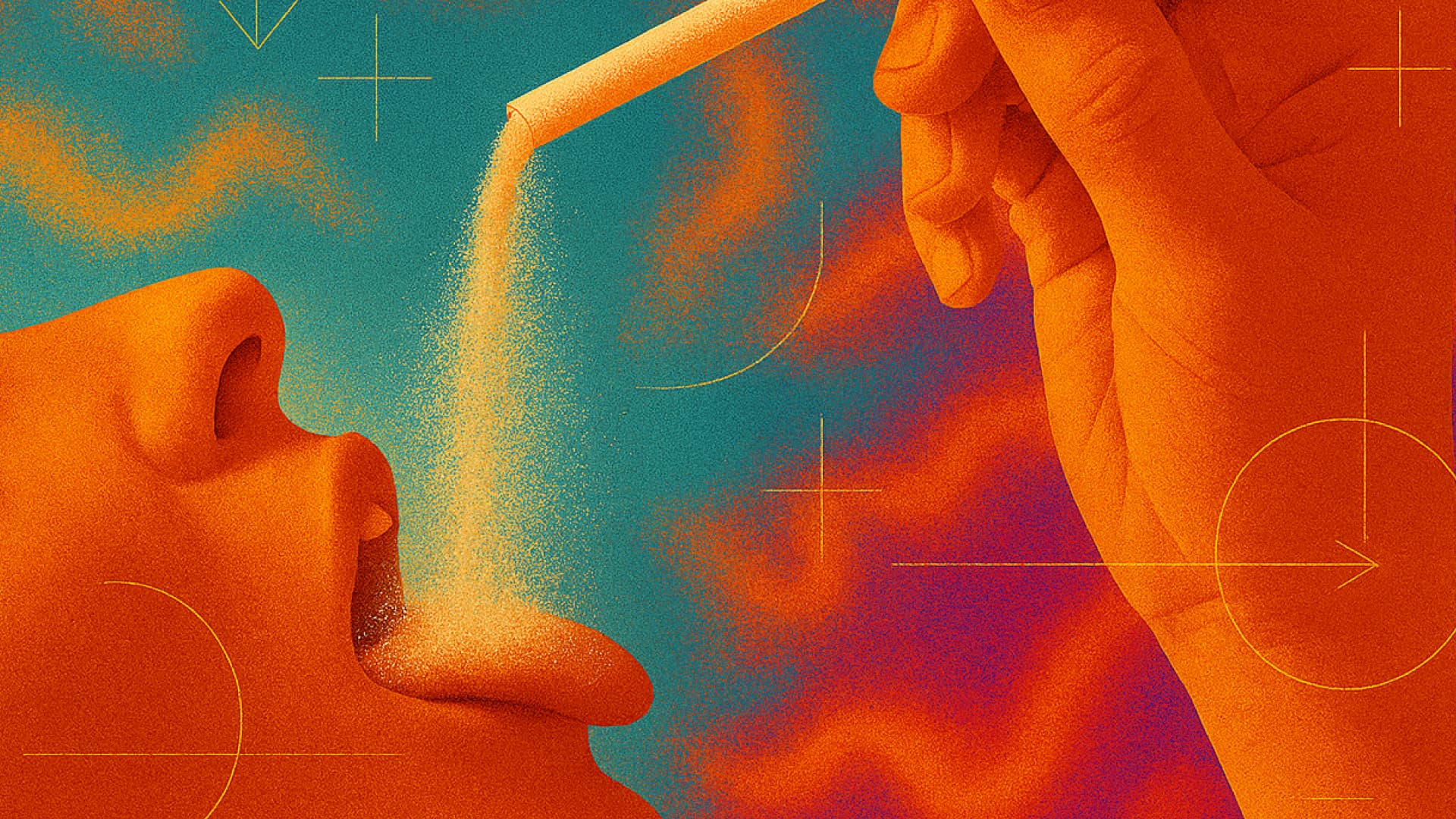How to Get Rid of Brain Fog: 52 Tips and Fixes
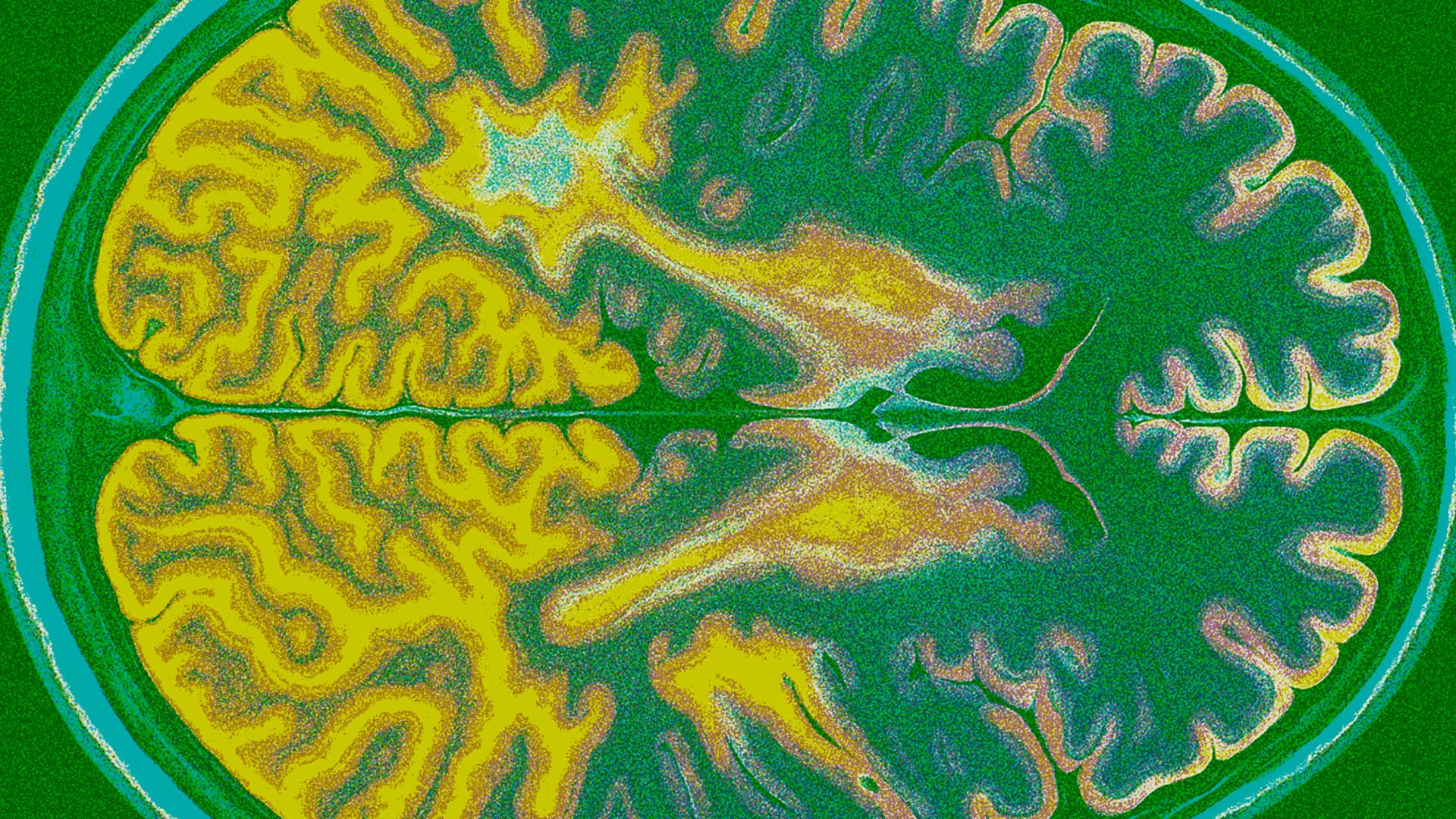
If you struggle with forgetfulness, have trouble focusing on pretty much anything, and feel mentally exhausted by mid-morning, brain fog might be to blame. We’re sharing science-backed, practical strategies to help clear that fog and bring out your best self.
I'm a mom of three kids under six, working full-time, and carrying most of the mental load at home (meals! laundry! chores! you get it!). So it's pretty standard for me to show up with coffee stains on my shirt, completely forget about soccer practice, and zone out halfway through parent-teacher conferences (wait, did she say my kid is the class clown?). Like so many moms deep in the chaos of early childhood, I’m wading through the thick, sticky brain fog that comes with it all.
For me, brain fog feels like I’m trudging through mental molasses. While it’s not a medical diagnosis, those of us who deal with brain fog know it as a constant haze of forgetfulness, mental fatigue, trouble focusing, and feeling like we’re just not operating at full capacity—like everything’s a little fuzzy and cloudy. For me, brain fog hits hardest when my to-do list balloons, but for some, it’s a daily struggle. However it shows up, brain fog is endlessly frustrating, totally draining, and downright annoying.
Depending on how thick the fog rolls in, brain fog can mess with just about everything—from getting through your workday and keeping up with daily responsibilities to truly being present with your kids. Fortunately for us, brain fog doesn’t have to stick around forever. I’ve done the research and I’m not about to gatekeep what’s helped. In this article, I’m breaking down the science behind brain fog and sharing 11 ways to clear the haze so you can start feeling like yourself again.
The science of brain fog
Like I said, brain fog isn’t a medical diagnosis—it’s more of a common way people describe a cluster of symptoms that affect thinking and mental clarity.
Everyone experiences brain fog differently, and the symptoms can vary widely from person to person. “Brain fog is considered a subjective symptom of cognitive dysfunction,” explains Trista Best, MPH, RDN, LD. This means it’s based on how a person feels about their own thinking and mental sharpness, rather than something that can be objectively measured. Since it's a subjective experience, brain fog can show up in completely different ways from one person to another.
So what might brain fog feel like?
- Like you’re floating through life (but not in a magical, fairy-dust kind of way).
- You can barely focus long enough to read a text message.
- Your thoughts feel scattered.
- Your brain feels “on” but somehow barely works.
- You feel spaced out or disconnected.
- You’re mentally exhausted.
- You keep forgetting if you fed the dog.
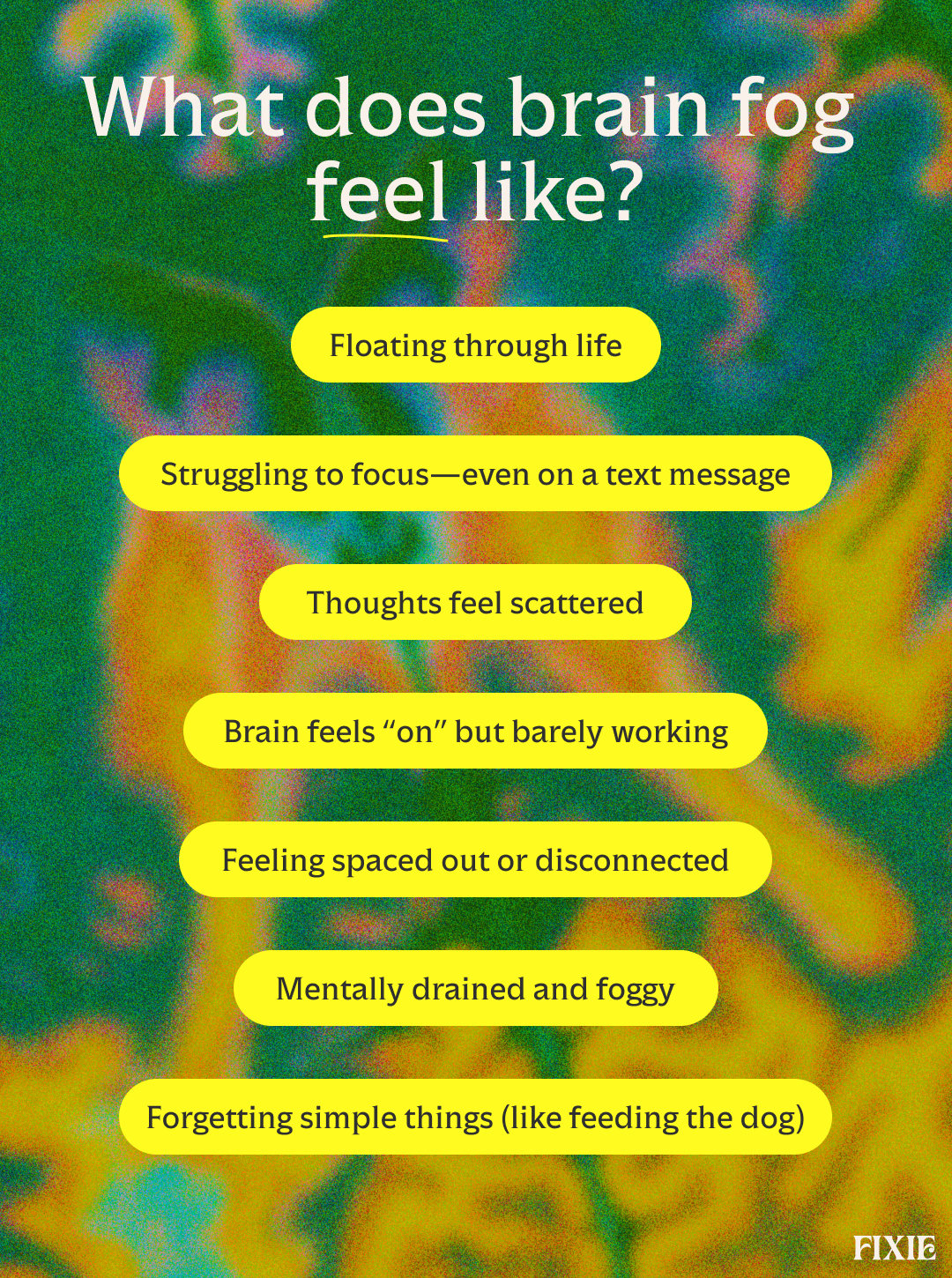
Brain fog triggers
While brain fog isn’t entirely understood, early research suggests it can be triggered by a wide range of factors that disrupt how the brain functions.
Here are some of the most common triggers:
- Hormonal changes: For women specifically, brain fog is thought to be connected to naturally-occuring hormonal shifts, which may explain why brain fog is common during pregnancy, postpartum, and perimenopause. The key player here is estrogen. Estrogen supports brain function and regulates neurotransmitters, the chemical messengers responsible for mood, memory, and focus. So when estrogen levels fluctuate or drop, it can directly impact cognitive function, making it harder to think clearly, stay focused, or remember who actually fed the dog.
- Inflammation: Research indicates a connection between inflammation and cognitive impairment, specifically peripheral inflammation, which is inflammation throughout the body’s tissues and organs. Interestingly, a study on brain fog related to long-COVID found that prolonged inflammation throughout the body and problems with the blood-brain barrier can interfere with key cognitive functions like memory, learning, focus, and mood. This suggests that when the body is dealing with chronic inflammation, the brain feels it too.
- Poor sleep: No shocker here. Lack of sleep (or poor-quality sleep) is a major brain fog trigger. When you're sleep-deprived, it becomes harder to concentrate, process information, or form coherent thoughts. Think back to those sleep-deprived moments—like the third trimester of pregnancy or those exhausting newborn days postpartum. Yep, that’s brain fog in action.
- Excessive screen time: Whether it's doom scrolling, working long hours on a computer, or binging Netflix late into the night, too much screen time can impact your brain. Excessive screen use has been linked to decreased attention span and executive functioning, leaving you feeling foggy, distracted, and just mentally worn out.
- Unhealthy dietary habits: What you eat directly affects your brain. Diets high in added sugars, ultra-processed foods, or ones that lack key nutrients (like iron) may negatively impact your brain.
Practical ways to get rid of brain fog
The good news is that brain fog isn't permanent, and you don’t need overpriced gadgets or trendy biohacks to lift the haze. In fact, the classic tried-and-true basics, plus a handful of targeted, research-backed nutrients, are the real secret to answering “how do I alleviate brain fog?”
Improve your sleep hygiene
Ask any tired mom—getting a good night’s sleep, though rare, can work absolute magic for your brain. “Sleep plays a vital role in keeping the body in a [balanced] state, from clearing toxins from the body to memory formation and mental wellness,” says Best. “Clinically, even a single night of poor sleep can slow reaction times and short-circuit your focus before you even know what hit you.” This means if you don’t get enough rest (or quality sleep), your attention, memory, and problem-solving skills are quick to take a hit.
How to optimize your sleep hygiene:
- Aim for 7 to 9 hours of quality sleep per night: Whether you’re a morning person or a night owl, find a schedule that works for you. This might mean going to bed earlier and waking up earlier, or the opposite. As a busy parent, it’s easier said than done, but adjusting your bedtime gradually each day can help you hit that 7-hour sweet spot.
- Develop a consistent sleep schedule: Just like kids benefit from bedtime routines, adults do too. Going to bed and waking up around the same time every day helps your body anticipate sleep and wind down for rest.
- Use a white noise machine: White noise machines can block out interruptions or loud noises from the outdoors, other family members, or raucous pets.
- Limit caffeine intake: Try to avoid caffeine for at least 6 hours before bedtime to help your body relax and prepare for sleep. For most people, this means drinking your last cup of coffee by 2 or 3 in the afternoon. If you’re still feeling foggy, consider cutting off caffeine even earlier. In a review of 24 studies, researchers found that caffeine can make it harder to fall asleep and reduce total sleep time and quality. To avoid these effects, the researchers suggest avoiding coffee at least 9 hours before bed and stronger caffeine products, like pre-workout supplements, at least 13 hours before bed.
- Install blackout curtains: Keeping your bedroom dark signals to your brain that it’s time for rest, which can improve sleep quality. You can go all out with traditional blackout curtains or opt for portable blackout window covers that stick onto windows, which are perfect if you travel often.
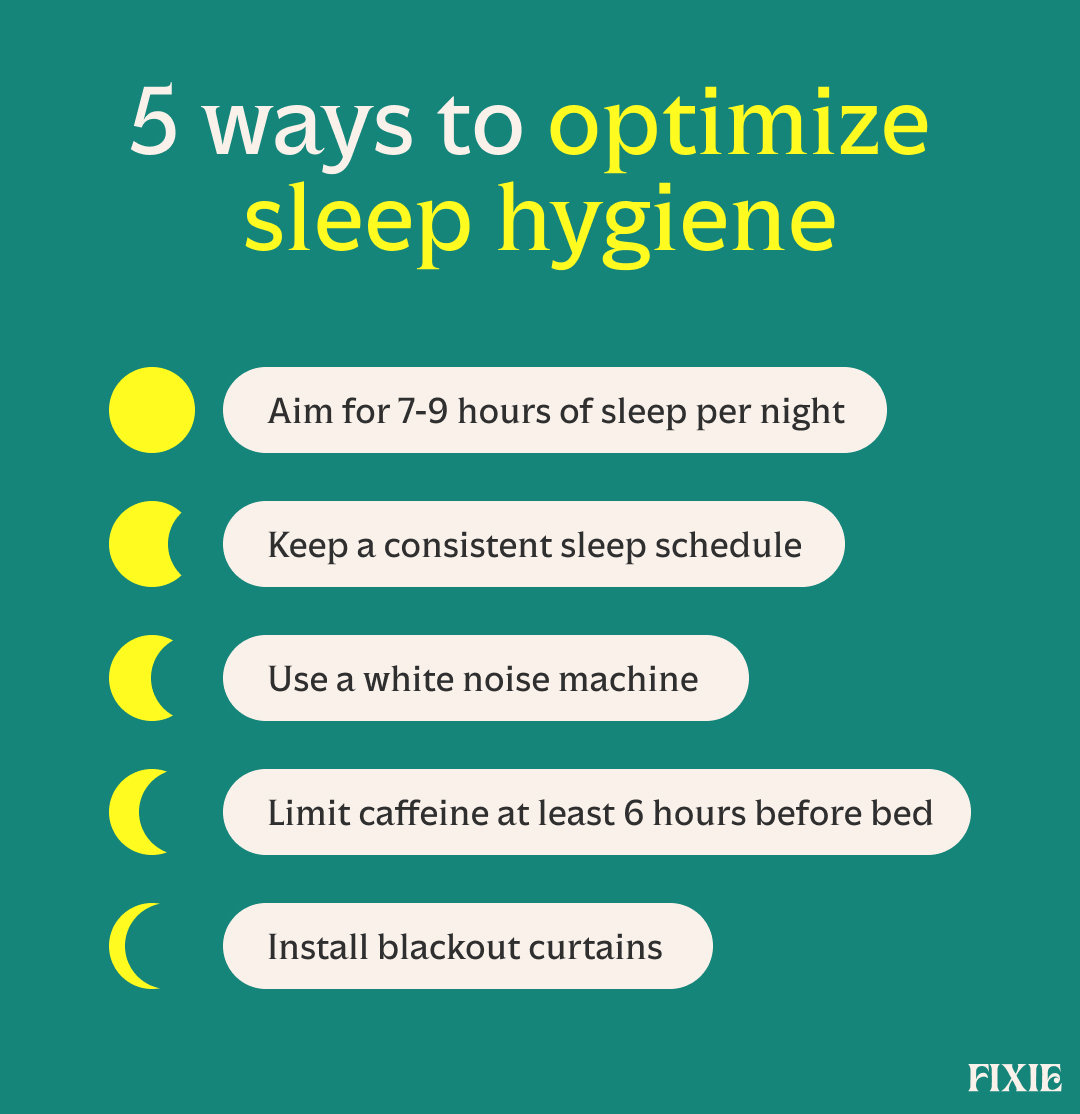
Move more throughout your day
Even though I’m pretty into wellness (I like to say I’m wellness-junkie-adjacent), moving my body is still the hardest part for me. I’d much rather read a book than go for a run or take a spin class. But I do it because movement is super important for the brain.
Movement improves blood flow that brings oxygen and nutrients to the brain, builds new brain cells, and helps create tiny blood vessels that further improve blood flow. This allows for the brain to make new neural connections, a process called neuroplasticity.
Small amounts of movement throughout the day can make a big difference in mental clarity. Find activities you enjoy to make it easier to turn movement into a sustainable habit.
Here are simple ways to add more movement to your day:
- Take a 15-minute power walk after each meal. This adds up to 45 minutes but broken into smaller (more do-able) chunks of time, and research shows accumulated exercise done throughout the day is just as effective for overall health—and sometimes more effective— than one continuous bout of exercise, once per day.
- Use the stairs whenever you go somewhere.
- Park your car farther away from your destination so you get in more steps.
- Join an online workout class.
- Find an accountability buddy to help keep track of your movement.
- If you have stairs at home, go up and down (like a stairmaster) while listening to a podcast.
- Have a dance party to your favorite music (for me, it’s 90s music!).
- Get your kids involved by running through sprinklers, playing tag, or going on a nature scavenger hunt together.
Take a deep dive into stress management
Stress is a major topic of conversation among my mom friends. Whether we're overwhelmed by balancing all the things, worried about our kids, or simply burdened by the constant mental load of motherhood, we're all feeling stressed—and it’s taking a toll on our brains.
“Stress can contribute to brain fog occurrence, frequency, and intensity,”explains Best. “This is because the stress hormone cortisol disrupts sleep, memory, and neurotransmitters in the brain.” When cortisol spikes, it throws off the delicate balance of hormones and neurotransmitters the brain needs to function properly.
Over time, chronic stress can impair memory by disrupting brain signaling and reducing blood flow. It can also take a toll on your entire body, leading to both physical and mental burnout, like brain fog.
These stress management techniques are worth a try:
- Yoga or stretching
- Mindfulness or meditation exercises
- Cognitive behavioral therapy (a good old-fashioned therapy session)
- Deep breathing exercises
- Spending time in nature (yes, go touch some grass!)
- Connecting with friends (if real conversation fills your cup)
Cut back on caffeine and booze
As much as I rely on my morning coffee(s) for a mental boost, I also know that too much caffeine isn't doing me any favors. Caffeine is a central nervous system stimulant, which means it excites the brain and body. In small doses, that’s helpful. But in excess, it can lead to symptoms like anxiety, poor sleep, jitteriness, and even disorientation—all of which can make brain fog worse.
Alcohol doesn’t help either. It interferes with the brain’s communication pathways and affects how the brain looks and functions. It impairs areas responsible for balance, memory, speech, and judgment—again, all things that can intensify brain fog.
While you don’t need to cut these out entirely, being mindful of your intake can go a long way in supporting clearer thinking and better overall brain health.
Here are some tips for a healthy relationship with caffeine and alcohol:
- Max out at 400 milligrams of coffee: Try to cap your caffeine intake at no more than 400 milligrams daily—that’s roughly two to three 12-ounce cups of coffee. If you're particularly sensitive to caffeine, you may need to cut back even further to avoid unwanted side effects.
- Gradually reduce your intake: If you’re used to sipping coffee like it’s water, cutting back all at once can be tough—and usually unsustainable. Instead, ease into it by gradually reducing your intake. Even cutting back by just a quarter of a cup every few days can help your body adjust without the withdrawal symptoms. Slow and steady wins the race here.
- Switch to alternatives: When you’re cutting back on anything, having go-to replacements makes a big difference. Try herbal teas, warm lemon-ginger water, or even mushroom coffee as satisfying coffee alternatives—especially for that second, third, or fourth cup of the day. For alcohol, there’s a growing variety of alcohol-free beverages that mimic the experience of drinking without the woozy downsides. Think mocktails, zero-proof spirits, and sparkling adaptogenic drinks that support relaxation without the hangover.
- Set clear limits: Before going out to a bar or party, decide how many drinks you’ll have and stick with it. This can avoid the feeling of pressure to to keep up with others or join in on buying rounds.
- Slow your pace: To stay balanced while drinking, have a glass of water between each alcoholic beverage to slow down your pace and keep you hydrated. It’s also helpful to eat beforehand, since having food in your stomach keeps it full and can reduce your urge to drink.
Upgrade your diet
“What you eat can directly influence how clearly you think,” says Gray. “Diets that are high in sugar and processed foods can lead to low energy and deprive your brain of essential nutrients needed to maintain function.” And that definitely checks out. Speaking from experience, I can’t count how many times I’ve felt foggy or sluggish after a weekend of fried chicken and a few too many slices of chocolate cake.
Take added sugar, for example. Foods high in added sugars can cause your blood sugar levels to spike rapidly, followed by a sharp crash. These crashes often lead to uncomfortable symptoms like energy slumps and fatigue.
Fortunately, small changes to your diet over time can significantly improve both your mental clarity and overall physical health. Here’s how:
- Limit added sugars: The CDC recommends keeping added sugar to less than 10% of your daily calorie intake. On a 2,000-calorie diet, that means no more than 200 calories from added sugar each day—roughly equivalent to a heaping ⅔ cup of vanilla ice cream. If you need help keeping track, consider downloading a food tracker app or go old-school by keeping notes with paper and pen.
- Adopt an anti-inflammatory diet: “Following an anti-inflammatory diet can be one of the most effective ways to reduce or prevent brain fog,” says Best. Prioritize whole, nutrient-dense foods, especially fruits and vegetables. These foods supply the vitamins and minerals your brain needs to stay sharp and focused.
- Focus on low-glycemic carbohydrates: Carbohydrates with a low glycemic index (GI) are digested slowly and don’t lead to spikes and crashes in blood sugar levels. These foods also take longer to digest and can also make you feel fuller for longer (win-win!). Low glycemic foods are typically whole, minimally processed foods, such as avocado, berries, broccoli, steel-cut oats, quinoa, lentils, and Greek yogurt.
- Focus on brain-boosting nutrients: Nutrients like omega-3 fatty acids (DHA and EPA) are critical for brain health. Found in fatty fish or taken as supplements, omega-3s support memory and may lower the risk of neurodegenerative diseases like Alzheimer’s due to their anti-inflammatory and antioxidant effects.
- Pair your meals wisely: Combining carbohydrates with protein or fats can slow down carbohydrate digestion, leading to more stable blood sugar levels. This prevents the symptoms of spikes and crashes that come after rapid sugar absorption.
Get creative with hydration
Staying hydrated is essential for overall health—after all, about two-thirds of your body is made up of water. Without enough of it, your body can't function efficiently.
Water is vital for everything from flushing out waste and supporting digestion to ensuring electrolyte balance and preventing dehydration. “Even mild dehydration from just a 2% loss in body water can impair focus, memory, and mental clarity,” says Gray. “Without proper hydration, blood flow to the brain decreases, which contributes to the foggy, unfocused feeling.”
If plain water doesn’t excite you, it’s time to get creative. Here are some easy ways to stay on top of your hydration:
- Carry a stainless steel water bottle wherever you go—your desk, car, nightstand, or gym bag. These bottles help keep your water ice cold for hours, which makes drinking more enjoyable (if you prefer water chilled).
- Set reminders on your phone or download a hydration tracking app to give you some gentle nudges throughout the day.
- Eat your water by incorporating hydrating foods like watermelon, cucumbers, celery, and leafy greens into your meals and snacks.
- Add natural flavor to your water with fresh citrus fruits, fresh herbs like mint or basil, or cucumber slices.
- Use unsweetened electrolyte powders to replenish the minerals lost through sweat, especially if you sweat heavily during workouts or in hot summer months.
Consider behavioral therapy
Depression can impact cognitive functions like working memory, long-term memory, and concentration. If you’re experiencing depression or other mental health challenges that lead to stress or mental cloudiness, it may be time to see a healthcare provider or mental health professional. In many cases, behavioral therapy can help. Behavioral therapy isn’t about “fixing” you, it’s about giving you tools and strategies to handle tough moments, manage stress, and start feeling more like yourself again.
Take mental breaks
Short mental breaks throughout the day aren’t just a way to veg out and chill, they’re actually a powerful way to boost your brainpower. Research shows that taking micro-breaks can improve your energy, reduce fatigue, and help you feel more refreshed. These little moments of rest give your brain a chance to reset, so you can return to your tasks with sharper focus and a fresh perspective.
If mental breaks appeal to you, here are some suggestions:
- Set a timer on your phone as a reminder to step away while you’re working, studying, or tackling a mega pile of laundry.
- Move your body during breaks from deep work (researching, writing). Do a few rounds of jumping jacking, walk up and down the stairs, or take a quick walk around the block.
- Schedule work calls between deep work sessions and take those calls on the go. Hop on a Zoom call on the treadmill or plug in your headphones for a stroll around the neighborhood.
Limit screen time
Ever feel like your brain’s turning to mush after hours of staring at a screen? You’re not imagining it. Too much screen time can overload your senses, drain your mental energy, and spike cortisol and stress levels. Over time, this can mess with your mood, sleep, and focus, fueling the brain fog cycle.
Now, I’m not saying you need to toss your TV out the window, but setting a few healthy screen boundaries can help keep your mind sharp.
Here are some suggestions:
- Follow the 20-20-20 rule: Every 20 minutes, look at something 20 feet away for 20 seconds. It gives your eyes and mind a much-needed reset.
- Create tech-free zones: Keep screens out of certain spaces, like the kitchen or bedroom, to make room for real conversations or quiet moments (of solitude?).
- Set screen-free hours: Power down all devices at least an hour before bed. Use that time to read, stretch, journal, or just unwind without a glowing rectangle in your face.
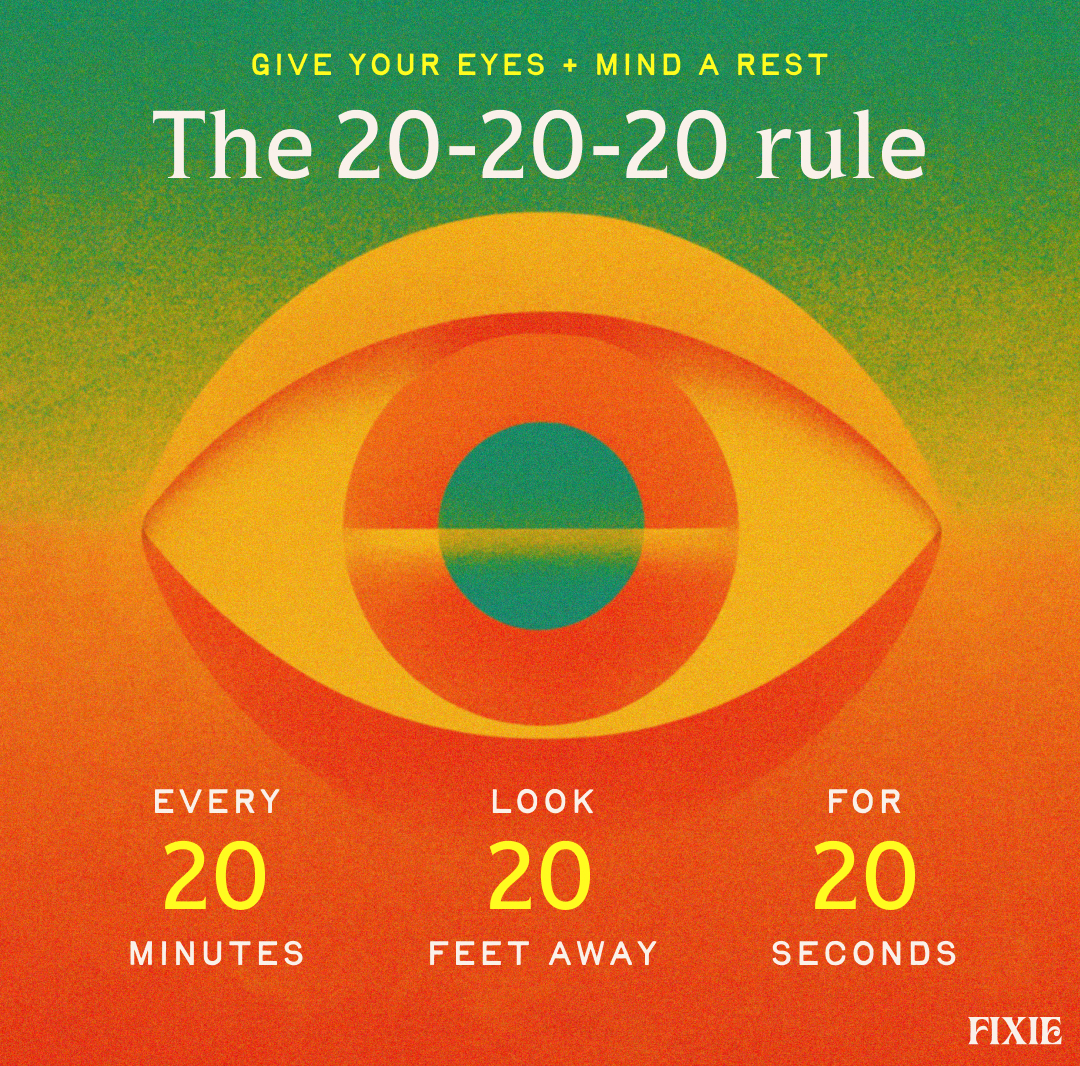
Explore brain-boosting supplements
Eating a perfectly balanced diet every day isn’t easy, especially if you’re a busy mom like me. Some days, the greens don’t make it to the plate, and protein comes second to whatever leftovers the kids leave on their dish. That’s where supplements swoop in to fill the nutritional gaps.
Nootropics are chemical substances that function as cognitive enhancers, intended to support and improve thinking, learning, and memory. Nootropic supplements often include a blend of vitamins, minerals, and other nutrients that work together to nourish the brain and help it function at its best. “The nutrient deficiencies most often associated with brain fog include iron, vitamin D, B12, magnesium, folate, choline, and omega-3 fatty acids,” says Best “Supplements may help address the underlying causes of brain fog, such as chronic inflammation or vitamin deficiencies.”
Here are a few brain-friendly nutrients to consider supplementing if you’re not getting enough in your diet:
- Omega 3 fatty acids: Support brain health and may lower risk of developing Alzheimer’s disease, dementia, and other problems with cognitive function.
- B vitamins: Crucial for energy production and brain function. Vitamin B12, specifically, supports both physical and cognitive health and helps reduce brain fog.
- Magnesium: Regulates nerve and muscle function, supports relaxation and calm, and may help reduce stress and anxiety.
- Vitamin D: May have neuroprotective effects.
- L-Theanine: Can reduce stress and promote calm.
- Citicoline: Supports the production of acetylcholine, a neurotransmitter critical for energy, attention, and memory.
- Acetyl-L-carnitine: Involved in brain cell energy production.
- L-Tyrosine: This amino acid helps produce dopamine and norepinephrine, which can improve cognitive flexibility and focus.
Sync with your doctor
Brain fog is a common symptom of other health issues.“While brain fog can be a common issue due to lack of sleep, stress, or poor lifestyle choices, it can be difficult to determine if there is a serious medical condition at the root of it all,” says Gray.
If you're experiencing persistent brain fog, it’s a good idea to speak with your healthcare provider. Here’s where to start:
- Keep a log of symptoms and timing. In the weeks before your appointment, take notes—the more you can identify patterns of when you zone out, the more info your provider will have to identify the cause of your brain fog.
- Request bloodwork. They may recommend bloodwork to check for nutrient deficiencies or run additional tests to identify potential causes.
- Review your meds. It’s also worth reviewing any medications you’re taking, as they could be contributing to the problem.
The bottom line
Brain fog can be an incredibly infuriating experience, whether you're just trying to remember where you left your keys or just trying to “think” normally again. The good news is that it's often treatable, and simple lifestyle changes can help clear the haze, making you feel more like yourself again.
Key takeaways
- Brain fog isn’t a medical diagnosis but rather a common way to describe a group of symptoms that impact thinking and mental clarity.
- Brain fog feels like a mental hangover, a traffic jam inside your brain, and a non-stop scatterbrain convention all rolled into one.
- Brain fog can be triggered by hormonal changes, inflammation, poor sleep, too much screen time, and unhealthy eating habits.
- Simple lifestyle changes like improving your diet, staying hydrated, prioritizing quality sleep, and using nootropic supplements can boost cognitive function and clear the mental haze.
Frequently Asked Questions
If you’re lying awake wondering, “how to get rid of brain fog fast,” you're not alone. While there’s no instant cure, the most effective approach is to start making small, sustainable lifestyle changes. Boosting your hydration, adjusting your diet, and taking short mental breaks can all help clear the fog and improve your cognitive function over time.
Certain vitamins and nutrients can support the brain and may help reduce the symptoms of brain fog.
- Vitamin B12: Involved in homocysteine metabolism, which impacts various body systems, including the nervous system. It also supports the production of healthy red blood cells and improves blood flow to the brain, all of which can help reduce brain fog.
- Omega-3 fatty acids: Supports brain health and development and cognitive function.
- Magnesium: Regulates healthy nerve and muscle function and calms the nervous system.
While there’s no universal “best” supplement for brain fog, nootropic supplements can support brain health and function. Look for nootropics that include brain-boosting ingredients like L-theanine, vitamin B12, Acetyl-L-carnitine, and magnesium.
If you’re wondering “how to fix brain fog,” it’s important to know there’s no guaranteed cure. However, focusing on good sleep, maintaining a balanced diet, staying active, and managing stress can make a significant difference. You might also consider targeted supplements like B12, omega-3s, and L-theanine to support your progress.
While there’s no single method to reverse brain fog, certain lifestyle changes can improve cognitive function and help clear the haze. Prioritizing restful sleep, staying physically active, managing stress, and maintaining a healthy diet are your best bets to refresh your mind and regain mental clarity.
Latest Posts
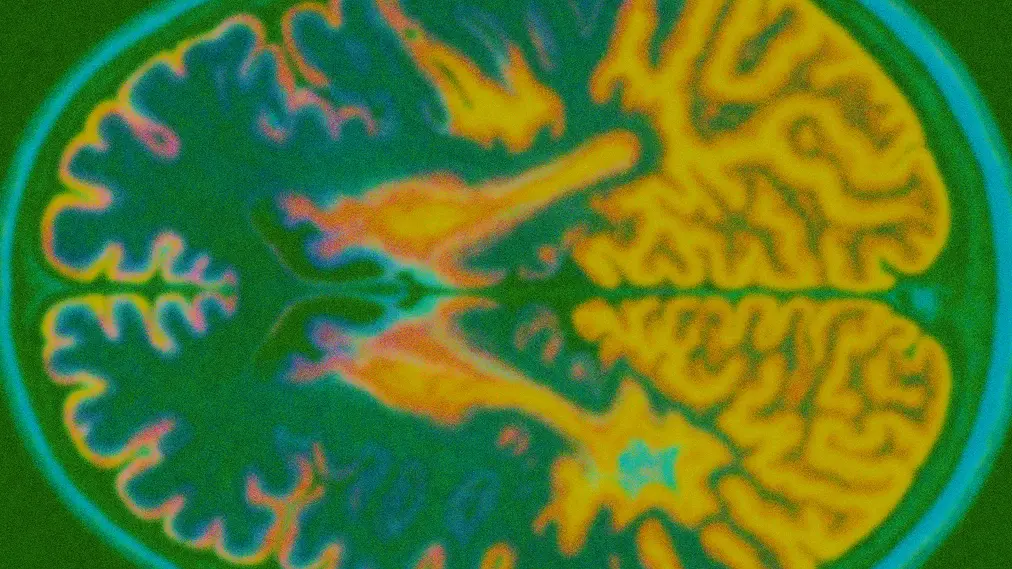

%20(1).JPG)




.svg)


